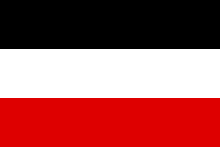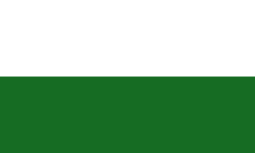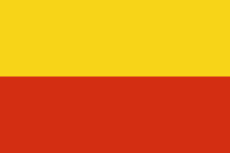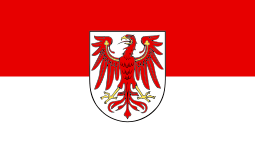Berlin 1881 chess tournament
The Deutscher Schachbund (DSB, the German Chess Federation) had been founded in Leipzig on July 18, 1877. When the next meeting took place in the Schützenhaus, Leipzig on July 15, 1879, sixty-two clubs had become members of the federation. Hofrat Dr. Rudolf von Gottschall became Chairman and Hermann Zwanzig the General Secretary.[1] When foreign players were invited to Berlin in 1881, an important and successful formula was completed. A master tournament was organised every second year, and Germans could partake in many groups and their talents qualified for master tournaments by a master title in the Hauptturnier.[2]
The Berlin 1881 chess tournament (the second DSB Congress,2.DSB-Kongreß), organised by Hermann Zwanzig and Emil Schallopp, took place in Berlin from August 29 to September 17, 1881.[3] The brightest lights among the German participants were Louis Paulsen, his brother Wilfried Paulsen, and Johannes Minckwitz. Great Britain was represented by Joseph Henry Blackburne, the United States by James Mason, a master from Ireland. Mikhail Chigorin travelled from Russia, and two great masters from Poland: Szymon Winawer and Johannes Zukertort, also participated. Karl Pitschel, from the Austro-Hungarian Empire, arrived and played his games in the first three rounds, but was unable to complete the tournament. The eighteen collected masters constituted a field of strength that had not been seen since the Baden-Baden 1870 chess tournament. The games were fiercely fought, as few draws were recorded, and a formula from this event would serve as a template for all future chess congresses in Germany before World War I.[4]
Masters Tournament
The final standings and crosstable:[5]
# Player 1 2 3 4 5 6 7 8 9 10 11 12 13 14 15 16 17 Total 1 

x 1 1 1 0 ½ 1 1 ½ 1 1 1 1 1 1 1 1 14 2 

0 x ½ 1 ½ 1 1 1 ½ 1 0 0 1 1 ½ 1 1 11 3 .svg.png)

0 ½ x 0 1 0 1 ½ 1 1 1 0 1 1 ½ 1 1 10½ 4 .svg.png)

0 0 1 x 0 0 0 ½ 1 1 1 1 1 1 1 1 1 10½ 5 

1 ½ 0 1 x ½ ½ 0 ½ 1 0 1 0 1 1 ½ 1 9½ 6 .svg.png)

½ 0 1 1 ½ x ½ 1 ½ 0 1 0 ½ 1 0 1 1 9½ 7 

0 0 0 1 ½ ½ x 1 ½ 0 0 1 ½ 1 1 1 ½ 8½ 8 .svg.png)

0 0 ½ ½ 1 0 0 x 1 1 ½ 1 0 ½ 1 ½ 1 8½ 9 .svg.png)

½ ½ 0 0 ½ ½ ½ 0 x 0 0 1 1 ½ 1 1 1 8 10 

0 0 0 0 0 1 1 0 1 x ½ 1 ½ 1 ½ ½ 1 8 11 

0 1 0 0 1 0 1 ½ 1 ½ x 0 ½ ½ 0 ½ 1 7½ 12 

0 1 1 0 0 1 0 0 0 0 1 x 1 0 1 0 1 7 13 

0 0 0 0 1 ½ ½ 1 0 ½ ½ 0 x 0 1 ½ 1 6½ 14 

0 0 0 0 0 0 0 ½ ½ 0 ½ 1 1 x 1 1 1 6½ 15 .svg.png)

0 ½ ½ 0 0 1 0 0 0 ½ 1 0 0 0 x 1 1 5½ 16 .svg.png)

0 0 0 0 ½ 0 0 ½ 0 ½ ½ 1 ½ 0 0 x 0 3½ 17 

0 0 0 0 0 0 ½ 0 0 0 0 0 0 0 0 1 x 1½ 18 .svg.png)

- - 0 0 - - - - 0 - - - - - - - - –
Hauptturnier A
The Haupturnier A was won by Curt von Bardeleben, who earlier beat Berthold Lasker, Siegbert Tarrasch and Seger, in a preliminary group.
1. Bardeleben 2½/3 (won a preliminary group, scoring 3/3)
2. Specht 2/3 (won a prel. group, scoring 2/3)
3. Kist 1½/3 (won a prel. group, scoring 2/2)
4. Reif 0/3 (won a prel. group, scoring 2/3)
References
- ↑ "DSB 1. Teil". Ballo.de. Retrieved 2011-12-05.
- ↑ "Deutschen Schachkongresse". Endgame.nl. Archived from the original on 2011-12-04. Retrieved 2011-12-05.
- ↑ Frank Hoppe. "Berliner Schachverband :: 2.DSB-Kongreß in Berlin 29.08.-17.09.1881". Berlinerschachverband.de. Archived from the original on 2012-07-20. Retrieved 2011-12-05.
- ↑ "Berlin 1881". Chessgames.com. Retrieved 2011-12-05.
- ↑ "berlin". Xoomer.virgilio.it. Retrieved 2011-12-05.
- ↑ "Welcome to the Chessmetrics site". Chessmetrics.com. 2005-03-26. Archived from the original on 2006-04-14. Retrieved 2011-12-05.
- ↑ "Name Index to Jeremy Gaige's Chess Tournament Crosstables" (PDF). Archived from the original (PDF) on 2007-07-04. Retrieved 2011-12-05.